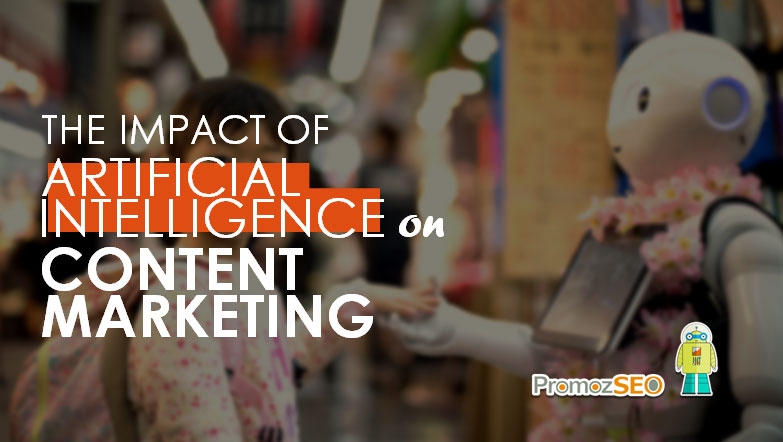The Impact of Artificial Intelligence on Content Marketing

Even though this technology has been around for quite some time, the use of AI in digital marketing has mainly been related to gathering, analyzing, and finding patterns in huge amounts of customer data.
Needless to say, access to such relevant data provides marketers with valuable information about their target audiences’ wants and needs and help them make better decisions about their digital marketing campaigns. In other words, it allows them to tailor their marketing message based on consumer intent and create relatable, personalized content for every segment of their audience.
However, the latest advancements in the fields of artificial intelligence and its subsets – machine learning, natural language processing (NLP), and natural language generation (NLG) add different dimensions to leveraging AI technology for content marketing purposes.
Here is how this superior tech will help you produce better content and improve your marketing efforts.
Content Personalization
Personalization has a crucial role both in the world of digital and content marketing.
Customers are tired of all the ads and content pieces that are not even close to their needs, and bored with receiving generic offers that don’t resonate with their pain points and interests. It’s no surprise that 77% would choose to pay more only to get the user experience that matches their needs.
The problem is that 60% of marketers face difficulties when they try to offer unique, personalized content to their target audience. With its ability to make sense of big data, AI can now provide some invaluable insights, and allow marketers to immediately act upon them.
With all data that AI gathers on the prospects, the algorithm can now select and show only the content or offers that are based on relevant criteria, for example, prospects’ age, location, education level, interests, previous purchases, etc.
You can best see how personalization works in the recommendations that Amazon and Netflix give to their users, that are tailored to suit their individual needs only. Both companies use their own proprietary algorithms that analyze different parameters and offer recommendations based on a number of factors such as every user’s previous purchases/viewing history or what others with similar preferences viewed or purchased.
However, the possibilities AI brings when it comes to content personalization are not only applicable to the content published on a blog or a website. AI-based email automation tools can do a fantastic job when it comes to segmenting and personalizing your email campaigns. You can now send campaigns tailored to match the specific group of your clients, with just a click. AI engine will personalize both the subject and email body, and decide on the best time to send emails.
There are several ways you can use the potential of AI for content personalization:
- The omnichannel approach that allows your customers to engage with your content through different channels of communication and devices – in a way that suits them the most.
- Using customers’ data and providing them relevant content based on different criteria – you can filter only the content on topics they’ve previously shown an interest for, or offer them location-based content.
AI can also help you ensure that every segment of content marketing is properly personalized.
For example, writing product descriptions is a highly time-consuming and challenging task, especially since search engines tend to penalize websites that use the copy-paste tactic when it comes to different variants of the same product.
For such purposes, China’s retail giant, Alibaba, has introduced an AI-powered tool for writing the original and optimized product description copy.
Content Creation
But, writing genuine product descriptions can’t really be considered content creation.
Artificial Intelligence is still far from being able to produce creative, unique, and engaging content, like the content human writers create. However, some AI tools are used to generate simple forms of content, such as reports on the stock market or sports events.
The capability of AI to create content is achieved thanks to the advancements in NLP and NLG.
Natural language generation (NLG) is a branch of AI that produces human-like verbal or written content. It uses large amounts of data and, with the help of powerful algorithms, translates them into stories.
Since NLG can write, but can’t read, natural language processing (NLP) is used to analyze unstructured data and turn it into numbers. NLG uses these numbers to produce human-readable text.
For example, Heligoraf, The Washington Post’s home-grown AI-journalist, wrote about 850 reports on high-school football games in the Washington D.C. area, attracting a decent amount of clicks during its first year.
The point is in outsourcing some low-value, menial tasks that don’t need any exceptional writing skills. In other words, the main role of these AI writers is to take the burden off the human writers’ shoulders and allow them to focus on creating well-researched, high-value stories.
Similarly, Bloomberg News relies on its in-house AI writer, Cyborg, to pick up the slack and churn out a massive number of quarterly company earnings reports. Well-versed journalists find this repetitive and low-value task boring and dead-end, which is why this intelligent algorithm frees up their time and allows them to do stories that require critical thinking and creativity.
That AI shows tremendous potential when it comes to content creation, can be seen in the fact that an intelligent robot almost won an award in a literary contest in Japan, by authoring a short novel.
So, how much does it cost to develop an AI solution for your company?
While we’re definitely talking about a hefty investment, it will undeniably take your business to the next level and bring you numerous benefits and allow you to cut corners on different repetitive, tedious tasks.
Increased Engagement
Conversations with customers are crucial for building meaningful relationships based on loyalty and trust.
AI can now generate content that addresses various customer issues, and answers different product-related questions, thus boosting their customer experience and satisfaction.
By now, most internet users have had a chance to communicate with a chatbot, even if they weren’t aware of that.
Since it’s impossible for the customer support team to be available all the time, companies are now making their services more accessible with the help of AI chatbots.
Since they have moved far beyond using canned sentences, these conversational robots are capable of having a human-like interaction with clients. In other words, they are no longer simple algorithms that rely on scripts and predefined sets of questions and answers. With the help of AI, chatbots have evolved into powerful conversational machines that can provide meaningful answers, collect customer information, and use them to customize future interactions – something that human support reps couldn’t do so easily and quickly.
The expectations of the customers have changed due to the rise of technology. They have become impatient, while the idea of being put frustrates them. And since human reps can’t handle more than one query at a time, there are numerous lost opportunities.
When a prospect is thinking about purchasing an item, an unanswered question or a complicated checkout process might result in the abandoned shopping cart, if not addressed promptly.
If your reps are not available at the moment to clarify the benefits of the feature or to help your customers with the checkout process, you’re at risk of losing a customer.
AI-powered chatbots can prevent this, as they’re always available and capable of interacting with several customers at a time. But, since they have access to large amounts of data on the customers, they’re able to personalize communication and offer the right content, providing much better user experience.
AI chatbots are very successful when it comes to boosting customer engagement, improving conversion rates, establishing more meaningful relationships with customers, and preventing their churn.
Process Automation
Content creation is a process, and its outcome depends on each one of the steps. Since certain steps consist of mainly repetitive tasks, content marketers can benefit greatly from automating them.
Topic and search engine automation
One of the first tasks is picking the right topic for your audience, the one that they will find useful, relevant, and interesting.
For such purposes, powerful AI-powered keyword research tools are vital. They can analyze huge amounts of data and find the topics that are the most popular for a particular search phrase and keyword.
Video content
Since video is on the rise, you should consider including it in your content marketing strategy. Customers no longer have enough time and patience to read lengthy blog posts. That’s why video content, which is much easier to consume and process, makes all the difference. People can watch videos while they’re commuting to work, working out at the gym, or doing something that doesn’t require their utmost attention.
Finally, according to some sources, people tend to memorize information presented through videos better than that presented in the form of text.
But, when it comes to video content, there’s one catch – it has to be of superb quality in order to work.
And equipment and professional video services can be very expensive.
However, there’s a shortcut that will allow you to repurpose your existing blog post and transform them into visually appealing videos.
If you’re a beginner in the field of video marketing, you can use AI-based tools like Lumen5 or Content Samurai, to easily turn your blog posts into video clips. With the help of AI, these tools pick up the context of the text you feed into them and come up with the best fitting images and clips. They come with a huge library of images and clips, as well as tunes that can be combined into a very attractive video material.
In addition, when you create your content, there are tools that can ensure that it meets your branded guidelines and the quality standards, regardless of the author.
Grammar and style
Another content optimization process that can benefit from AI-powered tools is proofreading. It’s only logical that your blog posts and other written content should be impeccable in terms of typos, grammar, and style. Instead of obsessively going through everything you write, trying to spot a mistake, you can take advantage of Grammarly and similar platforms.
What’s great about this software is that it can check all your written material both in Microsoft Office Suite, Google Docs, as well as on your website directly, thus eliminating the need to read everything all over again.
Another plus is that its premium version comes with a plagiarism checker so that you can make sure that all your blog posts are unique and prevent being penalized by Google for duplicate content.
Artificial intelligence, although still in its infancy, has already revolutionized content marketing, and with future developments in this field, we can expect that it will have an even more tremendous impact.
Although many content marketers are worried that intelligent machines will render them unemployed, currently, these powerful algorithms rely on the information that humans feed into them. There’s a chance that at a certain point in the future, we’ll have robot writers capable of producing creative and unique content, but the moment, this technology is only assisting us.
An advanced All-in-One Digital Marketing Course.
Mentored by Mr. Soumya Roy, the Founder, CEO of PromozSEO Web Marketing Academy.
- Reasons Your Business Needs to be on Instagram - September 16, 2021
- 7 Reasons Your Business Should Invest in Professional Content Creation - August 12, 2021
- 5 Ways You Can Improve Your Website’s Existing Backlinks - April 30, 2021





